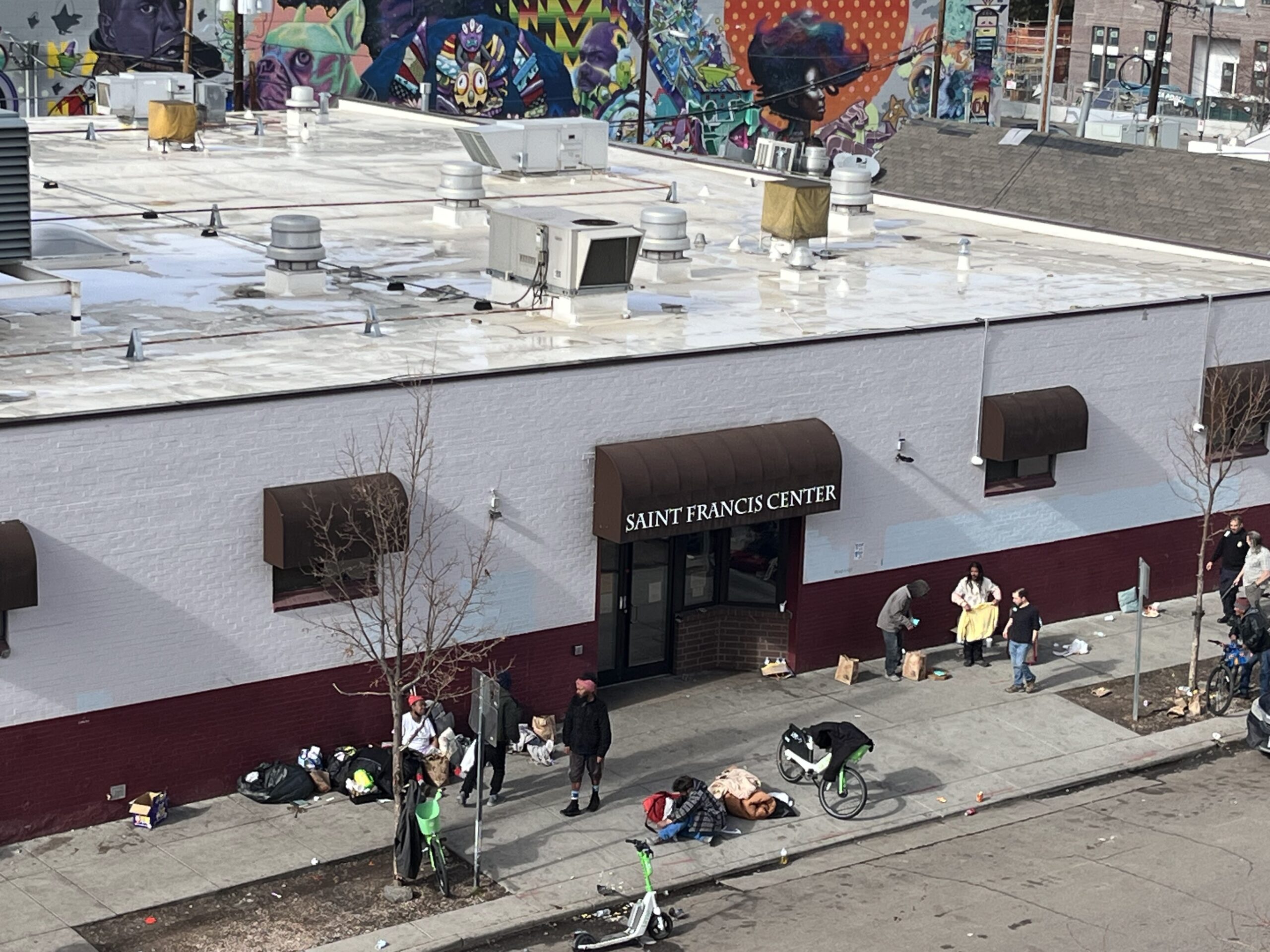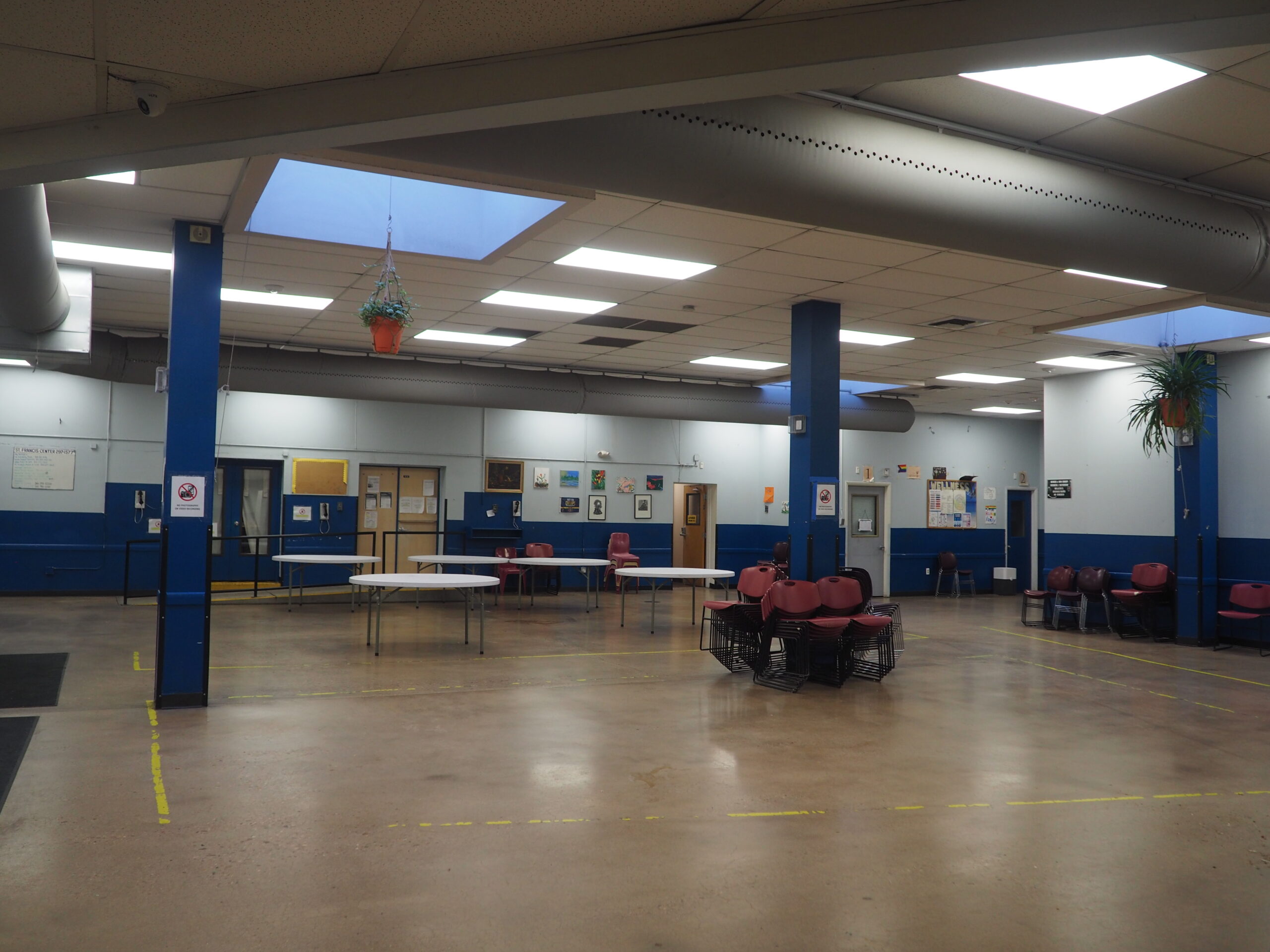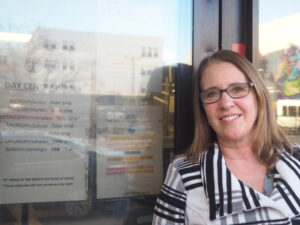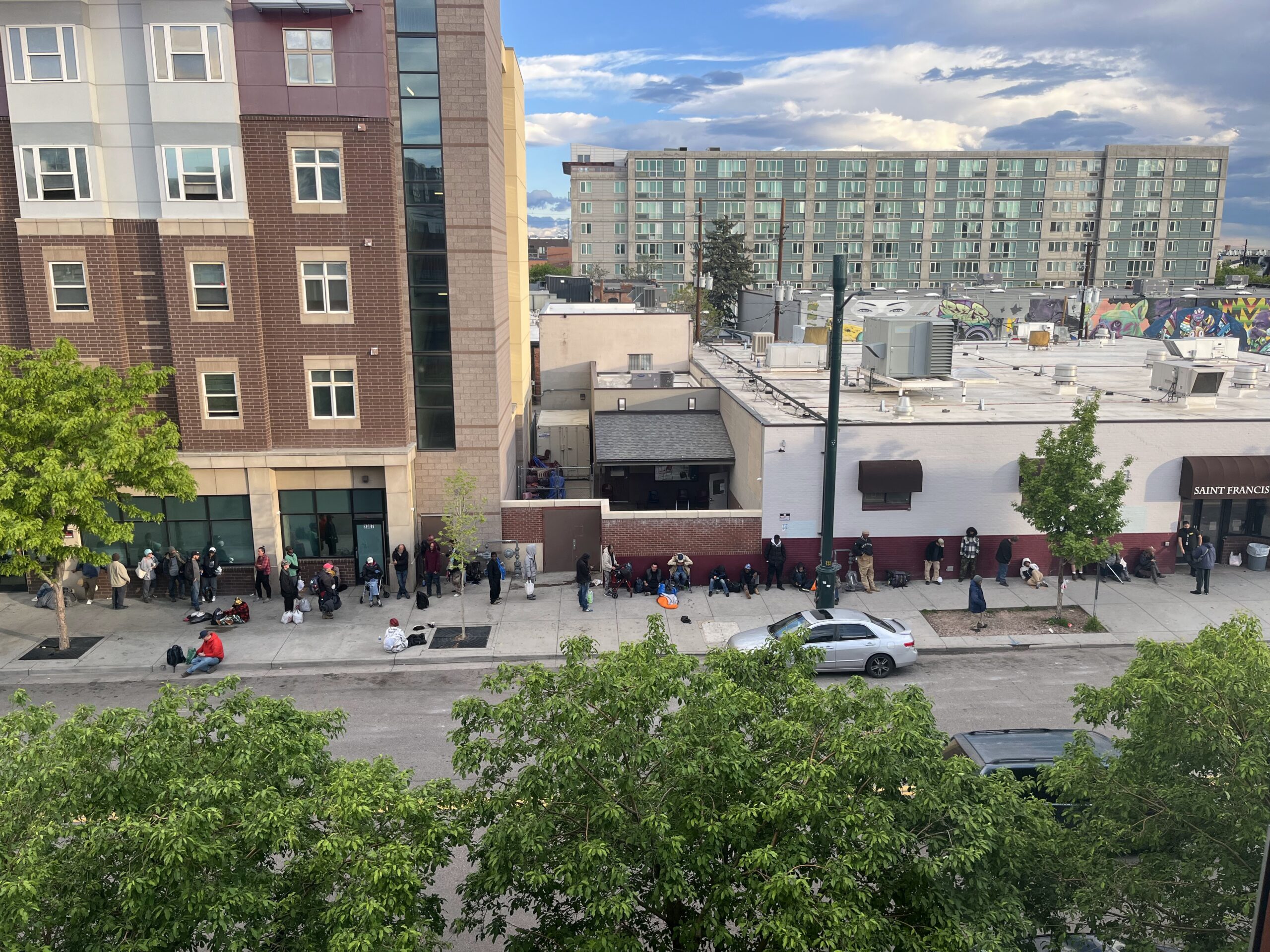
A February 2024 picture showing the outside of the St. Francis Center at 2323 Curtis St. (Courtesy Rachel Diedrich)
Rachel Diedrich speaks highly of her Curtis Park home.
Diedrich and her husband moved into a newly built row home in the 2300 block of Curtis Street in Denver in 2008. Part of the reason she’s been there 20 years, she said, are the “awesome” neighbors.
But that sentiment doesn’t include the one across the street.
“I don’t think they understand that the community does not feel like they’re a good neighbor,” she said.
Diedrich said the St. Francis Center, a nonprofit homeless day shelter at 2323 Curtis St., isn’t doing its part to keep the neighborhood clean and safe. Her husband was assaulted by a homeless man last year, and the two now have restraining orders against multiple individuals. A former president of the neighborhood association calls a nearby corner an “open-air crack market” and the living situation “untenable.”

Rachel Diedrich’s husband, Bobby Johnson, at an urgent care center getting stitches after he was assaulted at their front patio “by a guest of SFC,” she said. (Courtesy Rachel Diedrich)
“We’ve often called for health and safety of their guests or to report some of these trash, sanitation issues … people who repeatedly use my house as a bathroom facility in public view,” said Ashley Geisel, Diedrich’s neighbor.
And now, the SFC wants to expand its footprint.
“We can just look at the size of the block and the zoning … It’s already too much. It could be six times more,” said Ryan Cox, president of the neighborhood organization from 2021 to 2023.
Nancy Burke, CEO of the SFC since 2023, confirmed the organization’s interest in buying nearby properties and undertaking a redevelopment. But she thinks these acquisitions will decrease the number of homeless people on the block.
“What if we served less people?” Burke said. “What if we did housing, which, by nature, would change what happens here? What if it was less people, doing something with these pretty dilapidated buildings?”
For about a year, Diedrich and a small collection of other Curtis Park residents have been attempting to reach a “good neighbor agreement” with the SFC, which would require the nonprofit to commit to a number of security and cleanliness measures.
It also requires the organization first talks to its neighbors before expanding its footprint.
But despite Diedrich initiating the process herself — reaching out to City Councilman Darrell Watson in a plea for help — she’s not confident that the currently proposed agreement will be signed, or would even solve the problem.
“We’re getting pressured to sign this, but I don’t really know what many benefits it gives to the neighbors,” she said. “And even if we got all the things we wanted, there’s really no enforcement of it. It doesn’t really have any teeth.”
The St. Francis Center has been inside of an old 14,000-square-foot tire shop at 2323 Curtis St. for nearly40 years. It operates seven days a week, opening at 7 a.m. and closing in the early afternoon. No one stays overnight.

Inside the St. Francis Center after hours. (Matt Geiger/BusinessDen)
It’s a hub of daily life for many homeless people, with about 500 coming in and out each day, Burke said. Inside the main lobby on Wednesday, some sat in plastic chairs, sipping coffee, while others milled around seeking conversation and activities to pass the time.
People can use the SFC as their mailing address, receiving important documents and even voicemails. A series of offices and tucked-away rooms line the periphery of the building with various services, like storage, mental health support, clothing and showers.
But outside, the neighbors say the situation has spiraled out of control.
“They don’t have security to maintain their line in the morning. The front of our houses are unlivable in the morning — like, you cannot sleep,” said Geisel, who lives across the street.
“We had grass out front. Pandemic started. People started camping. So we put the riprap, the big rocks out there … they camped on the riprap, and then we had to put up the fence … it took a police presence for us to be able to put a fence on the corner of Park Avenue and Curtis,” said Bobby Johnson, Geisel’s neighbor and Diedrich’s husband.
Cox, who used to live on the block, said an open-air crack market “moved within Five Points … Ballpark and Curtis Park” over the years before settling in one area when tent encampments were dismantled after Mayor Mike Johnston took office in summer 2023.
“We ended up with the crack market, primarily at the corner of 24th and Curtis, as is what happens when you have a concentration of services and just the sheer number of people they serve every day,” Cox said.
Within 250 feet of the center, 143 crimes were reported last year, nearly 100 more than the 45 from the year prior, public records show.
Burke recognizes these frustrations, but said she’s limited by the funds she’s working with.
“We’re looking for new money to recruit in, because we see the benefit of this as well. You know, those are our tenants. We have people on the block as well, and we want to make sure it’s a safe block,” she said.
SFC has approximately $200,000 budgeted for security, Burke said, which includes a security guard that patrols the premises during the day and off-duty cops posted on the block for six hours after the shelter closes, four nights a week.
“We can’t reduce the security during the day to add during the night. So we end up sort of just walking between all of these options as best we can,” she said.

CEO Nancy Burke stands in front of the day shelter at 2323 Curtis St. (Matt Geiger/BusinessDen)
SFC’s total budget for 2025 is still being ironed out, but it’ll likely end up around $10 million, with about $1.5 million of that carved out for shelter operations, Burke said.
Last year, SFC had a budget of $9.7 million, much of which comes from contracts from the city. Its most recently available tax returns, from 2021, show the group receiving 93 percent of its funding from governmental sources.
During that time, the SFC has been busy building housing. It turned a church into nearly 50 apartments in Cheesman Park, built a new 50-unit apartment building in Cap Hill and opened a 60-unit complex last week at 2nd Avenue and Federal Boulevard in Denver’s Barnum neighborhood.
The next big development project for the group could be in its own backyard. Burke said the existing shelter “reads institution.”
“It’s just a concrete building … It doesn’t read safety, like some environments that you would see if you walked into a health clinic,” Burke said.
The nonprofit laid out its plans for the block in a May 2023 application to the city. Neighbors obtained it through a public records request last summer.
The document mentions the possibility of demolishing or building on top of the existing shelter building. The first floor would be for social services and offices — not the same type of day-use shelter that it is now. The second floor would be housing for 50 to 100 people seeking permanent housing, with floors above serving as “supportive housing” for 60 to 100 people.
SFC plans to do this by purchasing the 8,000-square-foot office building at 2347 Curtis St., whose owner told a local TV station in 2022 he felt “under siege” by the homeless population outside. A separate CBS report said he was dinged by Denver police for having feces on his property.
SFC now leases half of the building for administrative purposes. It’s up for sale, and Burke wants it, in addition to a single-family home that sits between the shelter and the office building.
Burke said SFC has no plans to make the site an overnight shelter.
“We do not do overnight shelter. We are not interested in it … I think that’s what they (neighbors) mean by expansion, is more of the day shelter, kind of activity, more people to sort of manage … We do not want to expand that way,” she said.

People line up to enter the shelter as it gets ready to open. (Courtesy of Rachel Diedrich)
Emails obtained by BusinessDen show Midori Higa, head of Denver’s Department of Housing Stability, or HOST, talking with staff last summer about overnight beds at the site.
“This would also be a fabulous location to flatten and rebuild with a shelter on the bottom level and maybe a few floors of housing on the top,” she wrote.
In a separate email, she said an expansion of the center’s hours would “likely create less perceived shenanigans in the area.”
But neighbors don’t buy that, nor do they have faith in Burke’s notion that the redevelopment would improve the block.
“I think Nancy has lied to us … She gets very upset when I say that, but that is honestly what I think,” Diedrich said.
Diedrich and other residents say that the SFC director has not been forthcoming about its plans, noting they obtained the expansion information via a records request. Burke said she told the board of the neighborhood association about it when she became CEO.
The yet-to-be-signed good neighbor agreement said SFC will not expand its footprint in the area without talking to neighbors.
Councilman Darrell Watson, who represents the area, told BusinessDen he is opposed to expansion.
“I do not support the expansion of St. Francis Center services on that street, and I’ve been clear to St. Francis Center, and I’ve been clear to the neighbors, and that is not something that’s changing.”
But that comes with an asterisk, to some degree.
“I will absolutely support expansion of permanent supportive housing,” he said. “That step for St. Francis Center is a very involved process that they will have to go through, and within that process for rezoning or for development, if they choose to go through that process, I’m certain will require funding from the Department of Housing Stability.”
Blue is the current site of the St. Francis Day shelter, with the buildings it wants to buy outlined in yellow.
The red highlighted building is an apartment complex developed by the St. Francis Center and currently run by another nonprofit.

